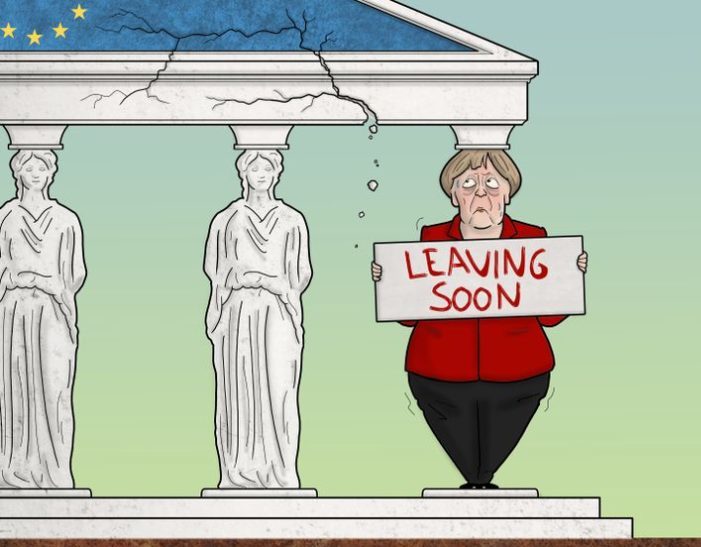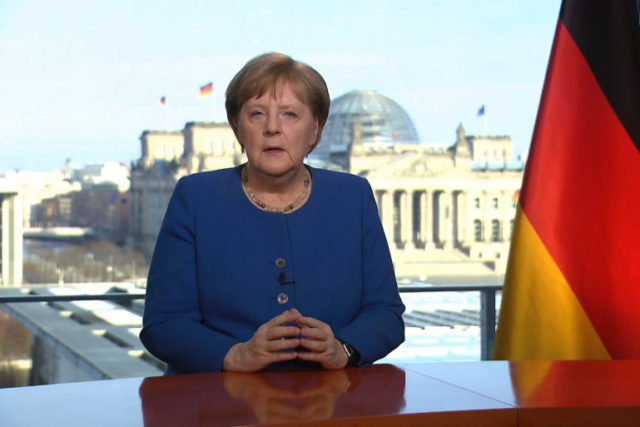It is thus no wonder that Berlin has so far refused to implement sanctions against Ankara regarding the non-respect of human rights in Turkey, for fear that Erdoğan opens the floodgates of emigration. In addition, Germany prefers to turn a blind eye to Greek and Cypriot concerns over Turkey’s military expansionism in the Aegean Sea.
Concessions to Russia
With regard to Ukraine, although Merkel condemned Russia’s annexation of Crimea, she was reluctant to impose meaningful economic and financial sanctions. Ultimately, it was the destruction of the Malaysian airliner over Donbass by a Russian missile – which killed all 283 passengers and 15 crew – that at last convinced Germany and the rest of the EU of the necessity to punish Russian for its meddling in Ukrainian affairs [3].
Germany has backed only those sanctions that do not go against key economic interests. Despite intense US pressure, Berlin has refused to give up on Nord Stream 2, a pipeline that will pass through the Baltic Sea and will deprive Ukraine of a substantial income and its only political leverage on Russia. Thus, the buffer state finds itself in a yet more vulnerable situation. The American historian Timothy Snyder maintains that the greatest danger to Kyiv comes from being caught between the remnants of German nationalism, still present in mainstream parties in Germany, and Russian nationalism with its fascist nature and conservative values.
Concessions to Belarus
In November 2021, Merkel took the liberty to call the Belarusian dictator Lukashenko, hoping to put a stop to tensions on the Polish-Belarussian border, a political initiative deplored by the Polish and Baltic governments and the Belarusian opposition. It seems that Lukashenko won his risky bet: to force bilateral negotiations with his regime. One might have expected Germany to take a harder line against the despicable Belarusian government, one of the worst regimes of modern times. Was Merkel’s aim to aid Poland and the Baltic States or rather to prevent a new wave of migrants in Germany?
MERKEL: CHAMPION OF GERMAN INTERESTS
Without a doubt, the Chancellor has an impressive record in defending German interests, but it would be wrong to conclude that Europe is indebted to her. Though her government accepted a collective debt following the pandemic crisis in 2020, it was mainly to serve Germany’s long-term interests. A financial crisis in Italy coupled with anti-European sentiment would have threatened the Euro, the European project and, ultimately, German exports to the rest of Europe.
By denying David Cameron intra-European migratory concessions (to be used in exceptional circumstances), she unwittingly contributed to Brexit; by paying Turkey to contain migration flows, she allowed the Islamo-nationalist regime of Erdoğan to become even more bullish; by backing the Nord Stream 2 project, she has considerably weakened Ukraine, a Europhile and pro-western democracy; by negotiating directly with Lukashenko without the consent of Poland, Lithuania and Latvia, she has indirectly recognised the unelected Belarusian dictator. Merkel: not so pro-European after all. form-idea.com London, 4th December 2021. Edited by Annie Clein.
[3] It is concerning that Europeans are still hesitant to speak of a “war” declared by Russia on Ukraine, preferring to call it a “crisis”, when we all know, without a shadow of a doubt, that the Kremlin has been behind this conflict from the start. Without Russian military aggression, we would have peace in Ukraine.

- ANGELA MERKEL : L’UNITÉ EUROPÉENNE ?
- Painting: Silence & Correspondence
- Cinema: Dunkirk, Churchill and the Brexiteers
- Is Belarus less European than France?
- Anu Samarüütel | From Tallinn to London and back, with colours



